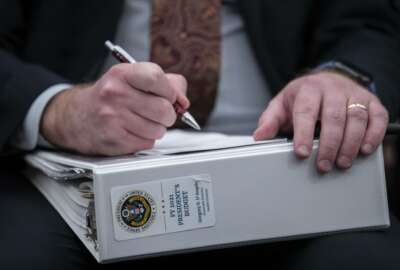

The National Security Commission on Artificial Intelligence urges Congress and the president to stand up a Digital Service Academy and a reserve corps modeled after...
A congressional commission studying the role of artificial intelligence in national security has already warned lawmakers to avoid cuts in research and development to prevent a “brain drain” of talent in the federal workforce.
But to recruit AI talent into federal service, the National Security Commission on Artificial Intelligence is urging Congress and the president to stand up a Digital Service Academy (USDSA) to develop new AI talent and a reserve corps modeled after the National Guard to tap into private-sector expertise.
Unlike military service academies, USDSA students would enroll to serve a five-year stint in federal civilian government after graduating. During the four-year degree program, students would intern at federal agencies and private-sector tech companies and go through the security clearance process.
Graduates would enter the federal workforce as a GS-7 after going through a job placement process during their final year.
NSCAI Chairman and former Google CEO Eric Schmidt told reporters in a call Wednesday that the academy and reserve corps build off the commission’s previous recommendations about developing a pipeline of AI talent.
“It’s incredibly important that the government get people who understand this stuff, can build it, can manage it, can contract it and can design it. There’s a real lack of the technical skills because they’re new and they’re really hard, so we’re looking for aggressive ways to get those people into the government in a way that they’re likely to stay,” Schmidt said.
The commission recommends Congress approve a two-year appropriation for $40 million to lay the groundwork for the academy as an independent federal agency.
The commission expects the academy would enroll its first class of 500 students three years after receiving congressional funding. Potential majors could include AI, software engineering, electrical science and engineering, computer science, molecular biology, computational biology, cybersecurity, data science, mathematics, human-computer interaction and robotics.
Meanwhile, the National Digital Reserve Corps would recruit a cadre of highly skilled digital experts to work at least 38 days a year as short-term advisers, developers and instructors within the government.
NSCAI Vice Chairman Robert Work, the former deputy secretary of the Defense Department, said the efforts to develop the academy and the reserve corps would go a long way toward improving the “digital literacy of the entire federal government.”
“The reserve officer corps is more along the lines of the National Guard, where people would go in, get a full ride, they graduate and they could join the Googles, Amazons and Apples of the world,” Work said. “But for 38 days a year, two days a month and 14 days during the summer, they would come in and help either a cabinet agency or a military department to pursue AI applications and to try to figure out how AI technology can help them perform their duties better.”
The Office of Management and Budget would serve as the human resources hub for reservists, and would provide funding and administrative support. Full-time OMB employees would serve as leaders for each “node” for digital reservists and approve projects for reservists to complete.
Reservists would work with agencies on a project-by-project basis and would have to remove themselves from any perceived conflicts of interest that involve their full-time work. Agencies would be responsible for paying for their projects and for reservists’ time.
As an incentive, reservists would be eligible for up to $50,000 in AI-related continuing education or student loans.
While U.S. efforts to stay on the leading edge of AI capabilities have been compared to the space race of the 1960s, Schmidt said AI expertise is “diffusing very rapidly” across the globe.
“In other words, if you put a bunch of people in Los Alamos and you asked them to invent algorithms, other folks are likely to invent algorithms in a similar timeframe in different places. Whereas the same is not true, for example, in hardware,” Schmidt said. “Anyone who thought that somehow we could take AI and treat it like the secret bomb codes, the knowledge is just too broad. There’s too many countries involved, there’s too many really smart people around the world working on it.”
In order to prepare agencies for the “era of great power competition,” the commission urges the State Department to improve its infrastructure and reorient diplomacy around AI. The agency, for example, played a key role in getting 40 countries, including the U.S., to agree to a common set of AI principles through the International Organization for Economic Cooperation and Development.
Meanwhile, the Defense Department in February formally adopted a set of AI ethics principles recommended by the Defense Innovation Board, which is also led by Schmidt.
While the Trump administration has recommended cutting most areas of federal research and development in its annual budget requests, the White House has made a notable exception for AI and has even proposed doubling AI R&D spending by 2022.
Work said DoD has also seen its AI capabilities mature quickly over the past few years.
“I think the department went through a phase where they almost considered AI like a seasoning, where you would sprinkle AI over everything we do, and everything would magically get better. What has happened is the department has started to pursue specific applications. It’s become much more sober and deliberate in the development.”
While the DoD has matured its AI capabilities through its Joint AI Center, the Energy Department, one of the top three funders of AI research in civilian government, named former 3M executive Cheryl Ingstad as its first director of its AI and Technology Office.
“Across the government, if anything, it’s ‘are we going too slow?’ I don’t think it’s overhyped,” Work said.
The workforce recommendations stand out as one of six lines of effort the commission submitted in its second-quarter report. The commission will submit its final report to Congress and the president in March 2021.
Copyright © 2025 Federal News Network. All rights reserved. This website is not intended for users located within the European Economic Area.
Jory Heckman is a reporter at Federal News Network covering U.S. Postal Service, IRS, big data and technology issues.
Follow @jheckmanWFED



